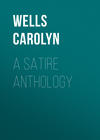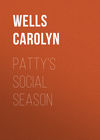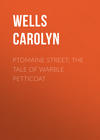Kitabı oku: «A Satire Anthology», sayfa 9
Yazı tipi:
CACOËTHES SCRIBENDI
IF all the trees in all the woods were men,
And each and every blade of grass a pen;
If every leaf on every shrub and tree
Turned to a sheet of foolscap; every sea
Were changed to ink, and all earth’s living tribes
Had nothing else to do but act as scribes,
And for ten thousand ages, day and night,
The human race should write, and write, and write,
Till all the pens and paper were used up,
And the huge inkstand was an empty cup,
Still would the scribblers clustered round its brink
Call for more pens, more paper, and more ink.
Oliver Wendell Holmes.
A FAMILIAR LETTER TO SEVERAL CORRESPONDENTS
YES, write if you want to – there’s nothing like trying;
Who knows what a treasure your casket may hold?
I’ll show you that rhyming’s as easy as lying,
If you’ll listen to me while the art I unfold.
Here’s a book full of words: one can choose as he fancies,
As a painter his tint, as a workman his tool;
Just think! all the poems and plays and romances
Were drawn out of this, like the fish from a pool!
You can wander at will through its syllabled mazes,
And take all you want – not a copper they cost;
What is there to hinder your picking out phrases
For an epic as clever as “Paradise Lost”?
Don’t mind if the index of sense is at zero;
Use words that run smoothly, whatever they mean;
Leander and Lillian and Lillibullero
Are much the same thing in the rhyming machine.
There are words so delicious their sweetness will smother
That boarding-school flavour of which we’re afraid;
There is “lush” is a good one, and “swirl” is another;
Put both in one stanza, its fortune is made.
With musical murmurs and rhythmical closes
You can cheat us of smiles when you’ve nothing to tell;
You hand us a nosegay of milliner’s roses,
And we cry with delight, “Oh, how sweet they do smell!”
Perhaps you will answer all needful conditions
For winning the laurels to which you aspire,
By docking the tails of the two prepositions
I’ the style o’ the bards you so greatly admire.
As for subjects of verse, they are only too plenty
For ringing the changes on metrical chimes;
A maiden, a moonbeam, a lover of twenty,
Have filled that great basket with bushels of rhymes.
Let me show you a picture – ’tis far from irrelevant —
By a famous old hand in the arts of design;
’Tis only a photographed sketch of an elephant;
The name of the draughtsman was Rembrandt of Rhine.
How easy! no troublesome colours to lay on;
It can’t have fatigued him, no, not in the least;
A dash here and there with a haphazard crayon,
And there stands the wrinkled-skinned, baggy-limbed beast.
Just so with your verse – ’tis as easy as sketching;
You can reel off a song without knitting your brow,
As lightly as Rembrandt a drawing or etching;
It is nothing at all, if you only know how.
Well, imagine you’ve printed your volume of verses;
Your forehead is wreathed with the garland of fame;
Your poem the eloquent school-boy rehearses;
Her album the school-girl presents for your name.
Each morning the post brings you autograph letters;
You’ll answer them promptly – an hour isn’t much
For the honour of sharing a page with your betters,
With magistrates, members of Congress, and such.
Of course you’re delighted to serve the committees
That come with requests from the country all round;
You would grace the occasion with poems and ditties
When they’ve got a new school-house, or poor-house, or pound.
With a hymn for the saints, and a song for the sinners,
You go and are welcome wherever you please;
You’re a privileged guest at all manner of dinners;
You’ve a seat on the platform among the grandees.
At length your mere presence becomes a sensation;
Your cup of enjoyment is filled to its brim
With the pleasure Horatian of digitmonstration,
As the whisper runs round of “That’s he!” or “That’s him!”
But, remember, O dealer in phrases sonorous,
So daintily chosen, so tunefully matched,
Though you soar with the wings of the cherubim o’er us,
The ovum was human from which you were hatched.
No will of your own, with its puny compulsion,
Can summon the spirit that quickens the lyre;
It comes, if at all, like the sibyl’s convulsion,
And touches the brain with a finger of fire.
So, perhaps, after all, it’s as well to be quiet,
If you’ve nothing you think is worth saying in prose,
As to furnish a meal of their cannibal diet
To the critics, by publishing, as you propose.
But it’s all of no use, and I’m sorry I’ve written;
I shall see your thin volume some day on my shelf;
For the rhyming tarantula surely has bitten,
And music must cure you, so pipe it yourself.
Oliver Wendell Holmes.
CONTENTMENT
“MAN WANTS BUT LITTLE HERE BELOW”
LITTLE I ask; my wants are few;
I only wish a hut of stone
(A very plain brown stone will do)
That I may call my own;
And close at hand is such a one,
In yonder street that fronts the sun.
Plain food is quite enough for me;
Three courses are as good as ten;
If Nature can subsist on three,
Thank Heaven for three – Amen!
I always thought cold victual nice —
My choice would be vanilla-ice.
I care not much for gold or land;
Give me a mortgage here and there,
Some good bank-stock, some note of hand,
Or trifling railroad share.
I only ask that Fortune send
A little more than I shall spend.
Honours are silly toys, I know,
And titles are but empty names;
I would, perhaps, be Plenipo —
But only near St. James;
I’m very sure I should not care
To fill our Gubernator’s chair.
Jewels are baubles; ’tis a sin
To care for such unfruitful things;
One good-sized diamond in a pin,
Some, not so large, in rings,
A ruby, and a pearl or so,
Will do for me; I laugh at show.
My dame should dress in cheap attire
(Good, heavy silks are never dear);
I own, perhaps, I might desire
Some shawls of true Cashmere —
Some marrowy crapes of China silk,
Like wrinkled skins on scalded milk.
Wealth’s wasteful tricks I will not learn,
Nor ape the glitt’ring upstart fool;
Shall not carved tables serve my turn,
But all must be of buhl?
Give grasping pomp its double care —
I ask but one recumbent chair.
Thus humble let me live and die,
Nor long for Midas’ golden touch;
If Heaven more gen’rous gifts deny,
I shall not miss them much —
Too grateful for the blessing lent
Of simple tastes and mind content!
Oliver Wendell Holmes.
HOW TO MAKE A MAN OF CONSEQUENCE
A BROW austere, a circumspective eye.
A frequent shrug of the os humeri;
A nod significant, a stately gait,
A blustering manner, and a tone of weight,
A smile sarcastic, an expressive stare:
Adopt all these, as time and place will bear;
Then rest assur’d that those of little sense
Will deem you sure a man of consequence.
Mark Lemon.
THE WIDOW MALONE
DID ye hear of the Widow Malone,
Ohone!
Who lived in the town of Athlone,
Alone?
Oh, she melted the hearts
Of the swains in them parts,
So lovely the Widow Malone,
Ohone!
So lovely the Widow Malone.
Of lovers she had a full score,
Or more;
And fortunes they all had galore,
In store;
From the minister down
To the Clerk of the Crown,
All were courting the Widow Malone,
Ohone!
All were courting the Widow Malone.
But so modest was Mrs. Malone,
’Twas known
No one ever could see her alone,
Ohone!
Let them ogle and sigh,
They could ne’er catch her eye,
So bashful the Widow Malone,
Ohone!
So bashful the Widow Malone.
Till one Mister O’Brien from Clare —
How quare.
It’s little for blushing they care
Down there —
Put his arm round her waist,
Gave ten kisses at laste —
“Oh,” says he, “you’re my Molly Malone,
My own!”
“Oh,” says he, “you’re my Molly Malone!”
And the widow they all thought so shy,
My eye!
Ne’er thought of a simper or sigh —
For why?
“But, Lucius,” says she,
“Since you’ve now made so free,
You may marry your Molly Malone,
Ohone!
You may marry your Molly Malone.”
There’s a moral contained in my song,
Not wrong;
And, one comfort, it’s not very long,
But strong:
If for widows you die,
Learn to kiss, not to sigh,
For they’re all like sweet Mistress Malone,
Ohone!
Oh! they’re very like Mistress Malone!
Charles Lever.
THE PAUPER’S DRIVE
THERE’S a grim one-horse hearse in a jolly round trot;
To the churchyard a pauper is going, I wot;
The road it is rough, and the hearse has no springs;
And hark to the dirge which the sad driver sings:
Rattle his bones over the stones!
He’s only a pauper, whom nobody owns.
Oh, where are the mourners? Alas! there are none;
He has left not a gap in the world, now he’s gone;
Not a tear in the eye of child, woman, or man;
To the grave with his carcass as fast as you can.
Rattle his bones over the stones!
He’s only a pauper, whom nobody owns.
What a jolting, and creaking, and splashing, and din!
The whip, how it cracks, and the wheels, how they spin!
How the dirt, right and left, o’er the hedges is hurled!
The pauper at length makes a noise in the world!
Rattle his bones over the stones!
He’s only a pauper, whom nobody owns.
Poor pauper defunct! he has made some approach
To gentility, now that he’s stretched in a coach;
He’s taking a drive in his carriage at last,
But it will not be long, if he goes on so fast.
Rattle his bones over the stones!
He’s only a pauper, whom nobody owns.
You bumpkins, who stare at your brother conveyed,
Behold what respect to a cloddy is paid!
And be joyful to think, when by death you’re laid low,
You’ve a chance to the grave like a gemman to go.
Rattle his bones over the stones!
He’s only a pauper, whom nobody owns.
But a truce to this strain; for my soul it is sad,
To think that a heart in humanity clad
Should make, like the brutes, such a desolate end,
And depart from the light without leaving a friend.
Bear soft his bones over the stones!
Though a pauper, he’s one whom his Maker yet owns.
Thomas Noel.
ON LYTTON
WE know him, out of Shakespeare’s art,
And those fine curses which he spoke —
The Old Timon with his noble heart,
That strongly loathing, greatly broke.
So died the Old; here comes the New;
Regard him – a familiar face;
I thought we knew him. What! it’s you,
The padded man that wears the stays;
Who killed the girls, and thrilled the boys
With dandy pathos when you wrote:
O Lion, you that made a noise,
And shook a mane en papillotes..
What profits now to understand
The merits of a spotless shirt,
A dapper boot, a little hand,
If half the little soul is dirt?.
A Timon you! Nay, nay, for shame!
It looks too arrogant a jest —
That fierce old man, to take his name,
You bandbox! Off, and let him rest!
Alfred Tennyson.
SORROWS OF WERTHER
WERTHER had a love for Charlotte
Such as words could never utter;
Would you know how first he met her?
She was cutting bread and butter.
Charlotte was a married lady,
And a moral man was Werther,
And, for all the wealth of Indies,
Would do nothing for to hurt her.
So he sighed and pined and ogled,
And his passion boiled and bubbled,
Till he blew his silly brains out,
And no more was by it troubled.
Charlotte, having seen his body
Borne before her on a shutter,
Like a well-conducted person,
Went on cutting bread and butter.
William Makepeace Thackeray.
MR. MOLONY’S ACCOUNT OF THE BALL
GIVEN TO THE NEPAULESE AMBASSADOR BY THE PENINSULAR AND ORIENTAL COMPANY
OH, will ye choose to hear the news?
Bedad, I cannot pass it o’er;
I’ll tell you all about the Ball
To the Naypaulase Ambassador.
Begor! this fête all balls does bate
At which I’ve worn a pump, and I
Must here relate the splendthor great
Of th’ Oriental Company.
These men of sinse dispoised expinse,
To fête these black Achilleses.
“We’ll show the blacks,” says they, “Almack’s,
And take the rooms at Willis’s.”
With flags and shawls, for these Nepauls,
They hung the rooms of Willis up,
And decked the walls, and stairs, and halls,
With roses and with lilies up.
And Jullien’s band it tuck its stand
So sweetly in the middle there,
And soft bassoons played heavenly chunes,
And violins did fiddle there.
And when the Coort was tired of spoort,
I’d lave you, boys, to think there was
A nate buffet before them set,
Where lashins of good dhrink there was.
At ten, before the ballroom door
His moighty Excellincy was,
He smoiled and bowed to all the crowd,
So gorgeous and imminse he was.
His dusky shuit, sublime and mute
Into the doorway followed him;
And oh, the noise of the blackguard boys,
As they hurrood and hollowed him!
The noble Chair stud at the stair,
And bade the dhrums to thump; and he
Did thus evince to that Black Prince
The welcome of his Company.
Oh, fair the girls, and rich the curls,
And bright the oys you saw there, was;
And fixed each oye, ye there could spoi,
On Gineral Jung Behawther was!
This gineral great then tuck his sate,
With all the other ginerals
(Bedad his troat, his belt, his coat,
All bleezed with precious minerals);
And as he there, with princely air,
Recloinin’ on his cushion was,
All round about his royal chair
The squeezin’ and the pushin’ was.
O Pat, such girls, such jukes, and earls,
Such fashion and nobilitee!
Just think of Tim, and fancy him
Amidst the hoigh gentilitee!
There was Lord de L’Huys, and the Portygeese
Ministher and his lady there,
And I reckonized, with much surprise,
Our messmate, Bob O’Grady, there.
There was Baroness Brunow, that looked like Juno,
And Baroness Rehausen there,
And Countess Roullier, that looked peculiar
Well, in her robes of gauze in there.
There was Lord Crowhurst (I knew him first,
When only Misther Pips he was),
And Mick O’Toole, the great big fool,
That after supper tipsy was.
There was Lord Fingall, and his ladies all,
And Lords Killeen and Dufferin,
And Paddy Fife, with his fat wife:
I wondher how he could stuff her in.
There was Lord Belfast, that by me passed,
And seemed to ask how should I go there?
And the Widow Macrae, and Lord A. Hay,
And the Marchioness of Sligo there.
Yes, jukes, and earls, and diamonds, and pearls,
And pretty girls, was sporting there;
And some beside (the rogues!) I spied,
Behind the windies, coorting there.
Oh, there’s one I know, bedad would show
As beautiful as any there,
And I’d like to hear the pipers blow,
And shake a fut with Fanny there!
William Makepeace Thackeray.
DAMAGES, TWO HUNDRED POUNDS
SPECIAL jurymen of England, who admire your country’s laws,
And proclaim a British jury worthy of the realm’s applause,
Gayly compliment each other at the issue of a cause
Which was tried at Guildford ’Sizes, this day week, as ever was.
Unto that august tribunal comes a gentleman in grief
(Special was the British jury, and the judge, the Baron Chief) —
Comes a British man and husband, asking of the law relief,
For his wife was stolen from him; he’d have vengeance on the thief.
Yes, his wife, the blessed treasure with the which his life was crowned,
Wickedly was ravished from him by a hypocrite profound;
And he comes before twelve Britons, men for sense and truth renowned,
To award him for his damage twenty hundred sterling pound.
He by counsel and attorney there at Guildford does appear,
Asking damage of the villain who seduced his lady dear;
But I can’t help asking, though the lady’s guilt was all too clear,
And though guilty the defendant, wasn’t the plaintiff rather queer?
First the lady’s mother spoke, and said she’d seen her daughter cry
But a fortnight after marriage – early times for piping eye;
Six months after, things were worse, and the piping eye was black,
And this gallant British husband caned his wife upon the back.
Three months after they were married, husband pushed her to the door,
Told her to be off and leave him, for he wanted her no more.
As she would not go, why, he went: thrice he left his lady dear —
Left her, too, without a penny, for more than a quarter of a year.
Mrs. Frances Duncan knew the parties very well indeed;
She had seen him pull his lady’s nose, and make her lip to bleed;
If he chanced to sit at home, not a single word he said;
Once she saw him throw the cover of a dish at his lady’s head.
Sarah Green, another witness, clear did to the jury note
How she saw this honest fellow seize his lady by the throat;
How he cursed her and abused her, beating her into a fit,
Till the pitying next-door neighbours crossed the wall and witnessed it.
Next door to this injured Briton Mr. Owers, a butcher, dwelt;
Mrs. Owers’s foolish heart toward this erring dame did melt
(Not that she had erred as yet – crime was not developed in her),
But, being left without a penny, Mrs. Owers supplied her dinner —
God be merciful to Mrs. Owers, who was merciful to this sinner!
Caroline Naylor was their servant, said they led a wretched life;
Saw this most distinguished Briton fling a teacup at his wife;
He went out to balls and pleasures, and never once, in ten months’ space,
Sat with his wife, or spoke her kindly. This was the defendant’s case.
Pollock, C. B., charged the jury; said the woman’s guilt was clear:
That was not the point, however, which the jury came to hear;
But the damage to determine which, as it should true appear,
This most tender-hearted husband, who so used his lady dear —
Beat her, kicked her, caned her, cursed her, left her starving, year by year.
Flung her from him, parted from her, wrung her neck, and boxed her ear —
What the reasonable damage this afflicted man could claim
By the loss of the affections of this guilty, graceless dame?
Then the honest British twelve, to each other turning round,
Laid their clever heads together with a wisdom most profound:
And towards his lordship looking, spoke the foreman wise and sound:
“My Lord, we find for this here plaintiff, damages two hundred pound.”
So, God bless the special jury! pride and joy of English ground,
And the happy land of England, where true justice does abound!
British jurymen and husbands, let us hail this verdict proper:
If a British wife offends you, Britons, you’ve a right to whop her.
Though you promised to protect her, though you promised to defend her,
You are welcome to neglect her; to the devil you may send her;
You may strike her, curse, abuse her; so declares our law renowned;
And if after this you lose her, why, you’re paid two hundred pound.
William Makepeace Thackeray.
THE LOST LEADER
I
JUST for a handful of silver he left us,
Just for a riband to stick in his coat —
Found the one gift of which fortune bereft us,
Lost all the others, she lets us devote;
They, with the gold to give, doled him out silver,
So much was theirs who so little allowed:
How all our copper had gone for his service!
Rags – were they purple, his heart had been proud!
We that had loved him so, followed him, honoured him,
Lived in his mild and magnificent eye,
Learned his great language, caught his clear accents,
Made him our pattern, to live and to die?
Shakespeare was of us, Milton was for us,
Burns, Shelley, were with us – they watched from their graves!
He alone breaks from the van and the freemen,
He alone sinks to the rear and the slaves!
II
We shall march prospering, not thro’ his presence;
Songs may inspirit us, not from his lyre;
Deeds will be done, while he boasts his quiescence,
Still bidding crouch whom the rest bade aspire.
Blot out his name, then; record one lost soul more,
One task more declined, one more footpath untrod;
One more devils’ triumph, and sorrow for angels,
One wrong more to man, one more insult to God!
Life’s night begins; let him never come back to us!
There would be doubt, hesitation, and pain,
Forced praise on our part – the glimmer of twilight,
Never glad, confident morning again!
Best fight on well, for we taught him – strike gallantly,
Menace our heart ere we master his own;
Then let him receive the new knowledge, and wait us,
Pardoned in heaven, the first by the throne!
Robert Browning.
THE POPE AND THE NET
WHAT! he on whom our voices unanimously ran,
Made Pope at our last Conclave? Full low his life began:
His father earned the daily bread as just a fisherman.
So much the more his boy minds book, gives proof of mother-wit,
Becomes first Deacon, and then Priest, then Bishop; see him sit
No less than Cardinal ere long, while no one cries “Unfit!”
But some one smirks, some other smiles, jogs elbow, and nods head;
Each winks at each: “I’ faith, a rise! Saint Peter’s net, instead
Of swords and keys, is come in vogue!” You think he blushes red?
Not he, of humble, holy heart! “Unworthy me,” he sighs;
“From fisher’s drudge to Church’s prince – it is indeed a rise!
So, here’s my way to keep the fact forever in my eyes!”
And straightway in his palace-hall, where commonly is set
Some coat-of-arms, some portraiture ancestral, lo, we met
His mean estate’s reminder in his fisher-father’s net!
Which step conciliates all and some, stops cavil in a trice:
“The humble, holy heart that holds of new-born pride no spice,
He’s just the saint to choose for Pope!” Each adds. “’Tis my advice.”
So Pope he was; and when we flocked – its sacred slipper on —
To kiss his foot we lifted eyes, alack, the thing was gone —
That guarantee of lowlihead – eclipsed that star which shone!
Each eyed his fellow; one and all kept silence. I cried “Pish!
I’ll make me spokesman for the rest, express the common wish:
Why, Father, is the net removed?” “Son, it hath caught the fish.”
Robert Browning.
Türler ve etiketler
Yaş sınırı:
12+Litres'teki yayın tarihi:
28 ekim 2017Hacim:
230 s. 1 illüstrasyonTelif hakkı:
Public Domain









